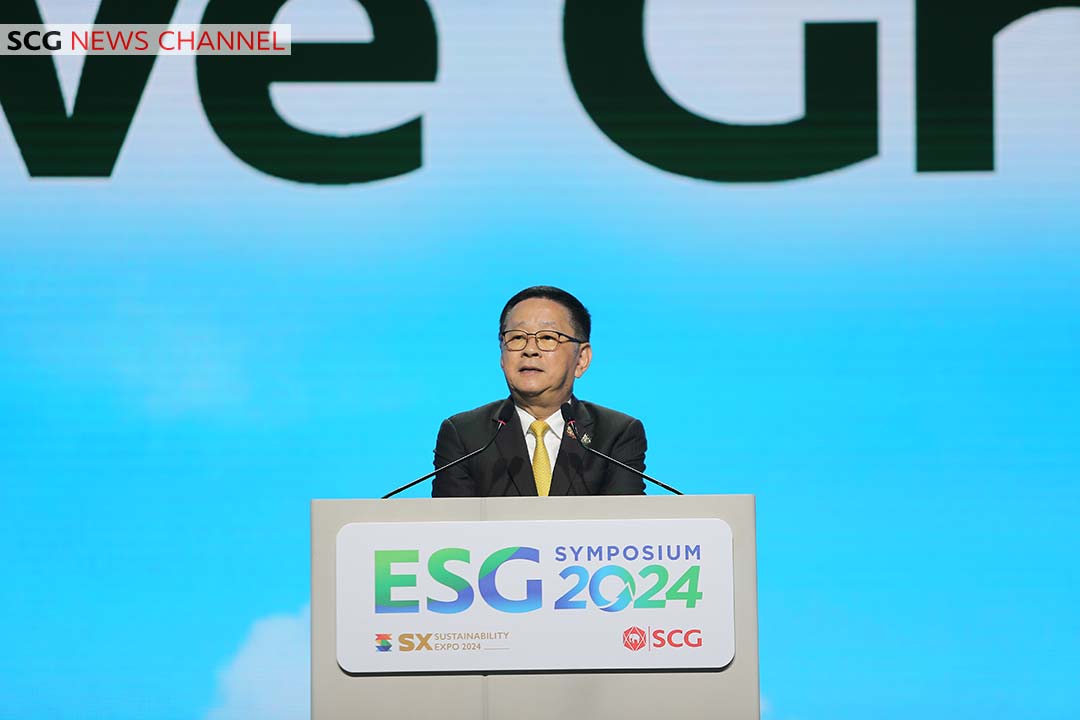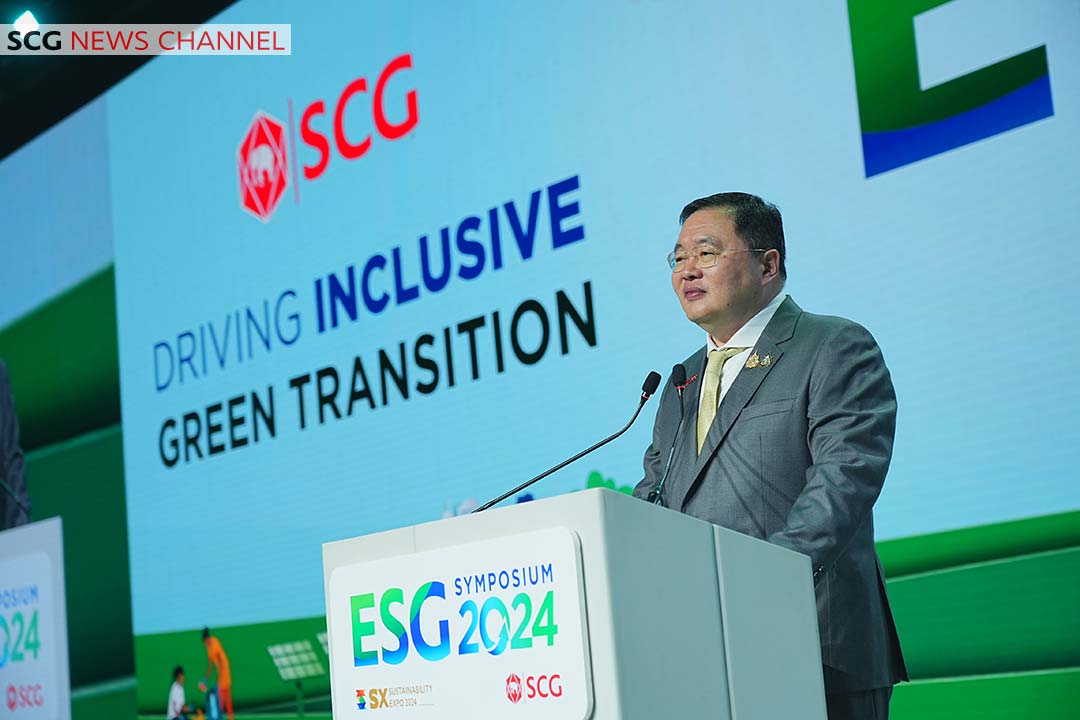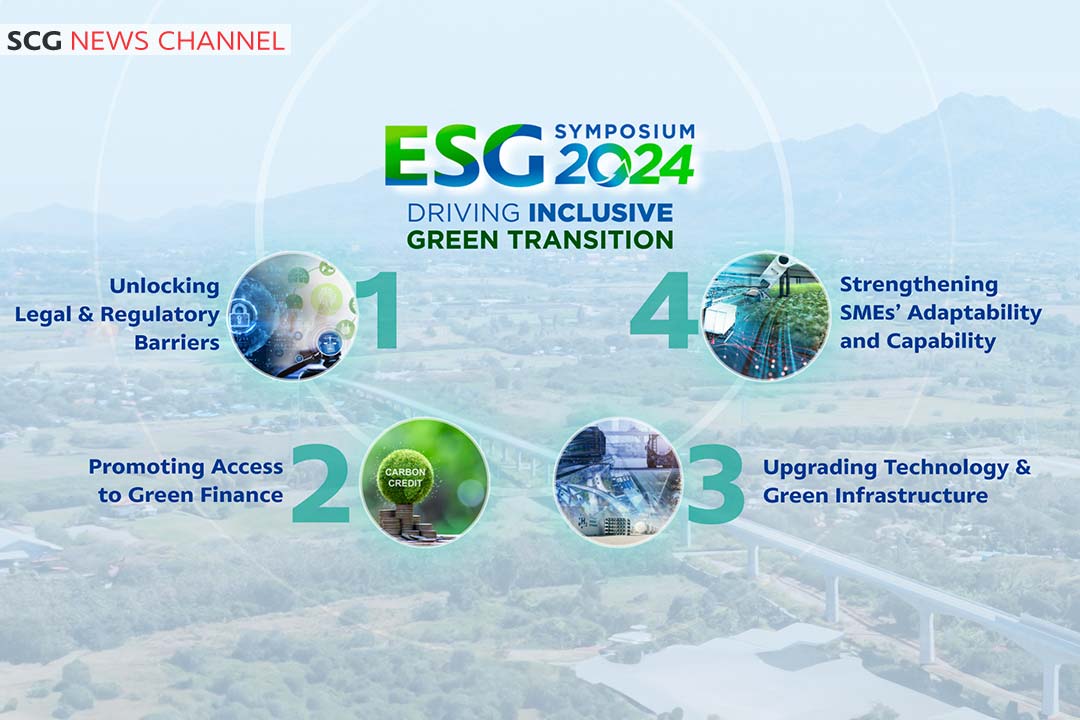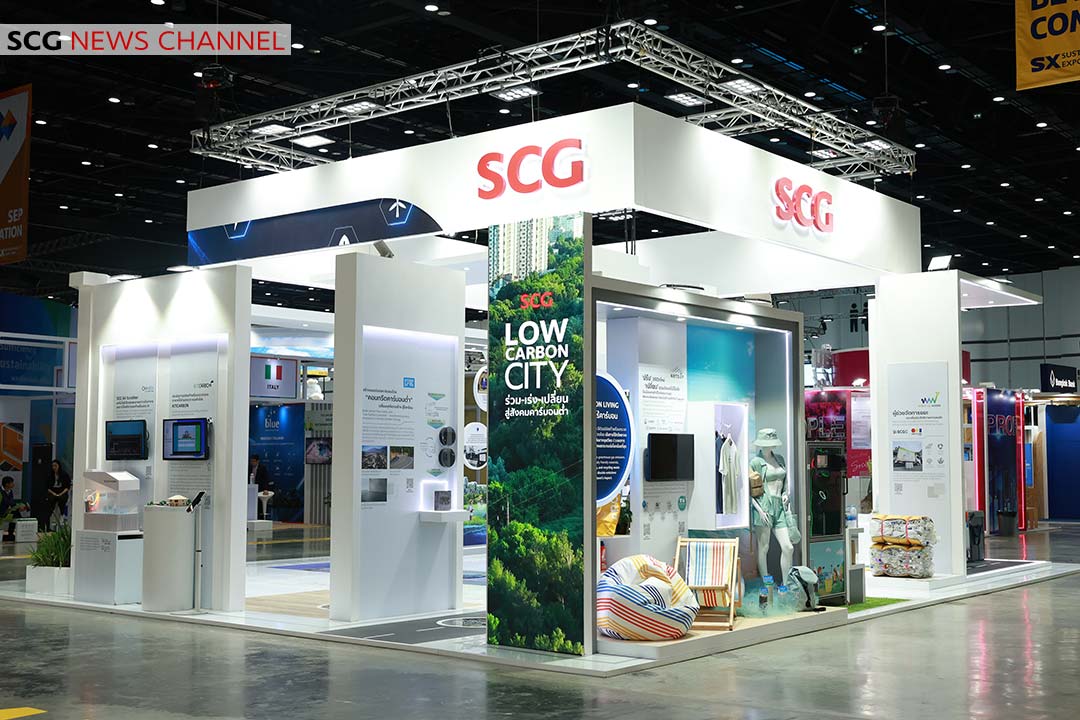Bangkok, 30 September 2024 – The government is ready to push forward the proposals to accelerate Thailand’s transition towards a low-carbon society, enhancing opportunities for a better quality of life, economic growth, and environmental sustainability. This follows the collaboration of over 3,500 representatives from the government, private sector, and civil society at the ESG Symposium 2024. The proposal aimed to accelerate the transition towards clean energy and a circular economy, using the ‘Saraburi Sandbox’ as a pilot project to create Thailand’s low-carbon society. The plan emphasizes four key approaches: unlocking legal and regulatory barriers, promoting access to green finance, developing technology and green infrastructure, and strengthening SMEs’ adaptability and capability. The government firmly believes that the power of collaboration will drive Thailand towards sustainable growth and resilience in the face of global changes across all dimensions.
Prasert Jantararuangtong, Deputy Prime Minister and Minister of Digital Economy and Society, attended the ‘ESG SYMPOSIUM 2024: Driving Inclusive Green Transition’, held on 30 September 2024 at Queen Sirikit National Convention Center, where he listened to proposals aimed at transitioning Thailand to a low-carbon society, based on the collective input from all sectors.

Thammasak Sethaudom, President & CEO of SCG, said, “Over the past two months, more than 3,500 representatives from all sectors have united their efforts and ideas to identify strategies to urgently drive Thailand towards a low-carbon society, building on the momentum from last year’s progress, which has led to tangible results. This took place at the ‘ESG SYMPOSIUM 2024: Driving Inclusive Green Transition,’ where key recommendations were compiled and presented to the government to expedite implementation through two main areas: 1) Transitioning to clean energy while promoting a circular economy; and 2) Utilizing the ‘Saraburi Sandbox,’ Thailand’s first low-carbon model city, as a pilot area to address policy, industrial system, and green infrastructure challenges while ensuring no one is left behind. These initiatives have been summarized into four key proposals as follows:”

Unlocking Legal & Regulatory Barriers: The government should expedite the liberalization of clean energy trading through grid modernization, enabling all sectors to access clean energy more easily. For large-scale clean energy projects, energy storage systems should be required to enhance stability. The government should also introduce a comprehensive master law on the circular economy, covering the entire system to encourage sustainable consumption. This includes promoting manufacturers to design products using alternative or recycled materials and to manage waste effectively. Incentive measures, such as tax reductions or subsidies, should be implemented along with support for research and development of related innovations. Furthermore, the government should promote the ‘Green Priority’ policy, emphasizing the use of environmentally friendly products, starting with public sector procurement to foster the adoption of green products and create a robust ecosystem.
Promoting Access to Green Finance: The government should support budget allocations for the development of human resources in businesses to enable them to obtain international carbon certification standards. Additionally, domestic agencies should be established to certify such standards, helping to reduce the costs associated with carbon credits. SCG is ready to act as a mentor, providing support and serving as a liaison to foster cooperation between various sectors.
Upgrading Technology & Green Infrastructure: The government should support the use and development of energy storage systems, such as heat batteries, to enhance the efficiency of renewable energy use. Existing infrastructure should be improved and green infrastructure should be utilized to its fullest potential, such as repurposing unused spaces for clean energy production. The power grid infrastructure should also be upgraded to support the transition to clean energy. In addition, efforts should be made to upgrade the comprehensive green logistics system to utilize clean and energy-efficient solutions, reducing costs and time through measures such as route optimization and appropriate cargo loading systems. Furthermore, the efficiency of waste sorting should be improved by promoting the separation of wet and dry waste. This can be achieved by establishing sorting and waste management centers that incorporate appropriate technologies, such as waste separation technologies and waste treatment systems.
Strengthening SMEs’ Adaptability and Capability: Efforts should focus on developing the workforce’s knowledge and understanding of clean energy to reduce costs. Additionally, promoting the adoption of innovations and technologies, such as Artificial Intelligence (AI) and Automation, will help enhance SMEs’ competitiveness. Building collaborative networks between different sectors is also essential to further boost the competitive edge of SMEs.

“However, these proposals will yield more tangible results and be better suited to Thailand’s context if the government continues to support the ‘Saraburi Sandbox,’ the low-carbon model city, by building on last year’s efforts. This initiative serves as a testing ground, incorporating Public-Private-People Partnership to implement the four proposals in a real-world setting. This approach will help identify opportunities, limitations, and solutions. The government’s promotion of decentralizing decision-making and operations to local agencies will reduce procedural steps and ambiguities in project implementation, accelerating progress across all fronts. This will create opportunities to expand the model to other provinces nationwide in the future.”
Thammasak continued, “The organizing committee would like to thank the Deputy Prime Minister of Thailand and the Minister of Digital Economy and Society for honoring us with his presence today and for listening to the proposals from all sectors to build a sustainable and high-potential society in line with the government’s ongoing focus on this matter. Additionally, I would like to thank all stakeholders for dedicating their time, effort, and commitment to solving these issues in an integrated manner. SCG and all its partners truly hope to receive the government’s support to turn these proposals into concrete action.”
Deputy Prime Minister of Thailand and Minister of Digital Economy and Society Prasert Jantararuangtong, said, “The government will take today’s proposals into consideration. For matters that can be promptly acted upon, we will coordinate immediately. For those requiring collaboration with relevant parties, we are open to knowledge exchange. In addition to what the government will do, the business sector must also adapt, seek opportunities, and enhance its capacity to meet the net zero goal by integrating sustainability measures or ESG principles. This will foster quality growth that is environmentally friendly and sustainably competitive. We all must work together to turn challenges, pressures, and constraints into the driving force that will propel Thailand towards sustainable growth and resilience in the face of global changes across all dimensions. Collaboration from all sectors is the key to success. The government will urgently push forward all key policies to support Thailand’s economic and social transition towards balanced and sustainable growth, ensuring that no one is left behind.”

The ‘ESG SYMPOSIUM 2024: Driving Inclusive Green Transition’ was held on 30 September 2024, at Hall 1, G Floor, Queen Sirikit National Convention Center, from 11:00 a.m. to 4:30 p.m. The event brought together participants from all sectors and featured world-renowned speakers who shared diverse experiences and examples of transitioning towards a low-carbon society. Attendees also had the opportunity to explore exhibitions showcasing low-carbon living. For more information, please visit www.scg.com.
Published on: Sep 30, 2024